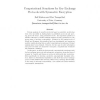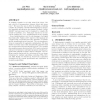154 search results - page 10 / 31 » Cryptographically Sound Theorem Proving |
110
Voted
CCS
2009
ACM
15 years 9 months ago
2009
ACM
Formal analysis of security protocols based on symbolic models has been very successful in finding flaws in published protocols and proving protocols secure, using automated too...
134
Voted
TCC
2004
Springer
15 years 8 months ago
2004
Springer
Abstract. We present a general method to prove security properties of cryptographic protocols against active adversaries, when the messages exchanged by the honest parties are arbi...
120
Voted
IJNSEC
2006
15 years 2 months ago
2006
Cryptographic algorithms often prescribe the use of primes whose length in bits is a power of 2. Recently, we proved that for m > 1, there is no prime number with 2m significan...
157
Voted
ACL2
2006
ACM
15 years 8 months ago
2006
ACM
A verifying compiler is one that emits both object code and a proof of correspondence between object and source code.1 We report the use of ACL2 in building a verifying compiler f...
115
Voted
TCC
2007
Springer
15 years 8 months ago
2007
Springer
We prove a computational soundness theorem for symmetric-key encryption protocols that can be used to analyze security against adaptively corrupting adversaries (that is, adversar...


